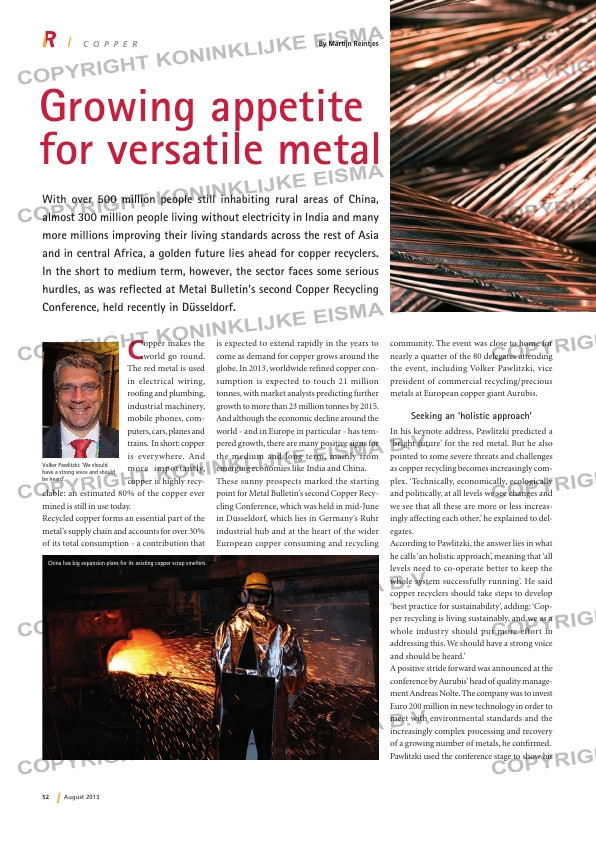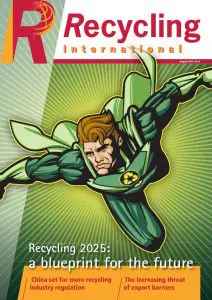Page 52 from: August 2013

52 August 2013
With over 500 million people still inhabiting rural areas of China,
almost 300 million people living without electricity in India and many
more millions improving their living standards across the rest of Asia
and in central Africa, a golden future lies ahead for copper recyclers.
In the short to medium term, however, the sector faces some serious
hurdles, as was reflected at Metal Bulletin’s second Copper Recycling
Conference, held recently in Düsseldorf.
Copper makes the world go round.
The red metal is used
in electrical wiring,
roofing and plumbing,
industrial machinery,
mobile phones, com-
puters, cars, planes and
trains. In short: copper
is everywhere. And
more importantly,
copper is highly recy-
clable: an estimated 80% of the copper ever
mined is still in use today.
Recycled copper forms an essential part of the
metal’s supply chain and accounts for over 30%
of its total consumption – a contribution that
is expected to extend rapidly in the years to
come as demand for copper grows around the
globe. In 2013, worldwide refined copper con-
sumption is expected to touch 21 million
tonnes, with market analysts predicting further
growth to more than 23 million tonnes by 2015.
And although the economic decline around the
world – and in Europe in particular – has tem-
pered growth, there are many positive signs for
the medium and long term, mainly from
emerging economies like India and China.
These sunny prospects marked the starting
point for Metal Bulletin’s second Copper Recy-
cling Conference, which was held in mid-June
in Düsseldorf, which lies in Germany’s Ruhr
industrial hub and at the heart of the wider
European copper consuming and recycling
community. The event was close to home for
nearly a quarter of the 80 delegates attending
the event, including Volker Pawlitzki, vice
president of commercial recycling/precious
metals at European copper giant Aurubis.
Seeking an ‘holistic approach’
In his keynote address, Pawlitzki predicted a
‘bright future’ for the red metal. But he also
pointed to some severe threats and challenges
as copper recycling becomes increasingly com-
plex. ‘Technically, economically, ecologically
and politically, at all levels we see changes and
we see that all these are more or less increas-
ingly affecting each other,’ he explained to del-
egates.
According to Pawlitzki, the answer lies in what
he calls ‘an holistic approach’, meaning that ‘all
levels need to co-operate better to keep the
whole system successfully running’. He said
copper recyclers should take steps to develop
‘best practice for sustainability’, adding: ‘Cop-
per recycling is living sustainably, and we as a
whole industry should put more effort in
addressing this. We should have a strong voice
and should be heard.’
A positive stride forward was announced at the
conference by Aurubis’ head of quality manage-
ment Andreas Nolte. The company was to invest
Euro 200 million in new technology in order to
meet with environmental standards and the
increasingly complex processing and recovery
of a growing number of metals, he confirmed.
Pawlitzki used the conference stage to show his
C o p p e r By Martijn Reintjes
Volker Pawlitzki: ‘We should
have a strong voice and should
be heard’.
Growing appetite
for versatile metal
China has big expansion plans for its existing copper scrap smelters.
RI-6_Copper.indd 52 01-08-13 11:47



